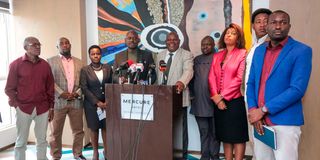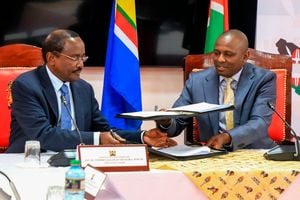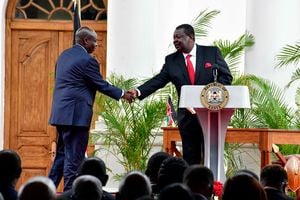
Kenya Kwanza and Azimio la Umoja bipartisan talks teams led by Rarieda Member of Parliament Otiende Amollo and Tharaka MP George Murugara during a media briefing on the proceedings of the talks at Crowne Plaza Hotel, Upperhill, Nairobi on May 5, 2023.
A joint parliamentary team will next Wednesday make a crucial announcement if Kenyans will have to go for a referendum in implementing some of the radical proposals contained in the National Dialogue (NADCO) Bills.
The decision has the potential of igniting major political realignments that could spill over to the 2027 General Elections, just like the 2005 referendum that shaped the 2007 contest between the late president Kibaki and Opposition leader Raila Odinga.
Constitutional experts have since noted that several proposed amendments contained in the Constitution of Kenya (Amendment) Bill, 2023 require referendum since their implementation will alter the structure of governance by introducing offices of Official Leader of Opposition and Prime Minister.
Other sweeping proposed changes include having senators serve a seven-year term instead of the current five, a proposal that will stagger the country’s general election.
The requirement for a referendum threatens to trigger a major political storm between President William Ruto’s Kenya Kwanza Alliance and Mr Odinga’s Azimio La Umoja One Kenya Coalition. President Ruto’s camp has publicly rejected calls for a referendum while Mr Odinga has indicated that some of the changes have to be subjected to a vote by the people.
“The principal object of this Bill is to amend the Constitution by parliamentary initiative in seeking to resolve issues of concern to the people of Kenya, promote national unity and inclusivity, enhance representative democracy, transparency, accountability and good governance and establish adequate checks and balances,” the Bill states in its memorandum.
Constitutional lawyer Bobby Mkangi said some of the proposals touch on Article 255 of the Constitution and, therefore, have to be subjected to a referendum. He said opting for a parliamentary initiative cannot shield proposals that seek to alter the principle of governance from being subjected to a vote.
“Parliamentary initiative cannot exclude a referendum if the proposed amendments relate to Article 255 of the Constitution.
Creation of the office of Official Leader of Opposition significantly affects the structure of the primary units that Kenyans created. It would require the voice of the people to change,” said Mr Mkangi.
Parliamentary route
“Changing the structure of governance will definitely come to the people. It has to be decided by the people, whether it is initiated through the parliamentary route or a popular one, it has to be subjected to a vote by the people,” he explained.
The joint committee on Justice and Legal Affairs from the National Assembly and the Senate on Thursday held its inaugural meeting where they announced that they want to separate amendments that can be implemented through a parliamentary route from those that require a referendum.
The committee has been given 45 days to submit its report before the two Houses of Parliament. National Assembly’s Justice and Legal Affairs chairperson George Murugara said it was too early to talk about the referendum question, even as he disclosed that the joint team will announce its position on the matter next week.
His deputy, Mwengi Mutuse (Mwingi West), in an apparent split in the team, was, however, categorical that there are proposals that will be amended through a referendum.
In his communication, Mr Murugara assured the public that the committee is equal to the task and will table its report within the 45 days given by the speaker of the National Assembly Moses Wetangula.
“We will have a series of meetings, today (yesterday) was just a preliminary one to decide on the days we will have the meetings and timings,” Mr Murugara said.
According to Article 256 of the Constitution, an amendment by parliamentary initiative “shall have been passed by Parliament when each House of Parliament has passed the Bill, in both its second and third readings, by not less than two-thirds of all the members of that House.”
However, if such a Bill proposes an amendment relating to a matter specified in Article 255 (1), ‘the President shall, before assenting to the Bill, request the Independent Electoral and Boundaries Commission to conduct, within ninety days, a national referendum for approval of the Bill.’ Rarieda MP Otiende Amollo – who is also a senior counsel – in his contribution when the House was adopting the report said there are several proposals that would require a referendum.
“There are areas that will require more careful navigation. First, is whether we require a referendum. My casual glance of the report suggests that we will be in four different areas. Second, is this thing of recommending a Senate of seven years. That will require us to really re-examine a number of things,” said Mr Amollo when the House adopted the NADCO report.
He added, “Third, is the idea of a staggered election. There are a host of reasons why there is a general election on the same day. If we are to interfere with this, we have to navigate very carefully.
Last is the question of the leader of official opposition and the office of the Prime Cabinet Secretary. We will have to re-examine our government structure.”
Immediately the NADCO report was made public, Mr Odinga declared that some of the proposals will have to be subjected to a referendum.
“To create the office of the leader of opposition or to formalise the office of the prime cabinet secretary, the people of Kenya have to have their say by way of a referendum,” said Mr Odinga.
“It is also our stand that this country cannot continue moving forward by being undecided. We have to agree whether we want a parliamentary, presidential or hybrid system,” he added.
Under the current presidential system of governance, Parliament only recognises the Majority Leader and the Minority Leader, with no provision for leader of official opposition.
But Mr Kimani Ichung’wah the KIkuyu MP told Nation that they have opted to take the parliamentary initiative route because of “the prevailing circumstance”, without elaborating.
“It (parliamentary initiative) is the route we took cognisant of the prevailing circumstances,” said Mr Ichung’wah. Article 255 of the Constitution states that a ‘proposed amendment to this Constitution shall be enacted in accordance with Article 256 or 257, and approved in accordance with clause (2) by a referendum, if the amendment relates to the supremacy of the Constitution; the territory of Kenya; the sovereignty of the people and the national values and principles of governance.
Other changes that require a referendum include an amendment to the Bill of Rights; the term of office of the President; the independence of the Judiciary and the functions of Parliament and the objects, principles and structure of devolved government. Political analysts reckon that going for a vote to change the Constitution could easily be turned into a protest vote against Kenya Kwanza administration.
A loss for President Ruto in the event of a referendum would be perceived as a vote of no confidence against his administration.
Although the report is a product of a joint team formed by President Ruto and Mr Odinga, there is no guarantee that the opposition and the ruling alliance would be on the same side should the country take a vote to amend the 2010 Constitution.











